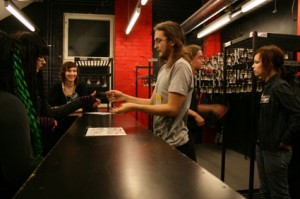I am working on a chapter on language attitudes for my book-in-progress for Routledge. I just wrote the following section, trying to explain how a language moves from having a standard form to having full-blown language-based discrimination. Is this too grossly over-simplified? The book is intended for students.
1) A standardized variety of a language emerges in the collective minds of a community of language users, based on the written form, and often (not always) related to the notion of a nation state.
2) The standard becomes associated with social prestige. As the standardized variety grows in stature and recognition in the collective minds of its users, ideologies emerge relating to the standard. These ideologies are based on who uses the standard and how these users perpetuate the perceived importance of the standard. Discourse about language emerges. The stature of the standard is discursively reinforced over time. Importantly, the ideals of the standard are applied not only to written language, but to spoken language, as well.
3) People whose speech (and writing) is perceived as being too distant from the standard are negatively viewed and denigrated for their language use. Their use of language is perceived by those within Standard Language Culture as a personal affront; that is, non-standard users are seen are refusing to play by the “self-evident” rules of language. Language use has shifted from being a property of the collective community of speakers to being in the hands of an elite group. Negative attitudes emerge towards those who do not conform to the norms of the elite.
4) The perceived rules of language use become so collectively engrained for an elite group of users that they form a perimeter around them. People who do not use language in the same way they do are effectively shut out from all sorts of social and public functions. Linguistic discrimination is in effect, but because the elite group perceives their language use as the only way of using language, language-based discrimination goes largely undetected, unaddressed, and dismissed.





